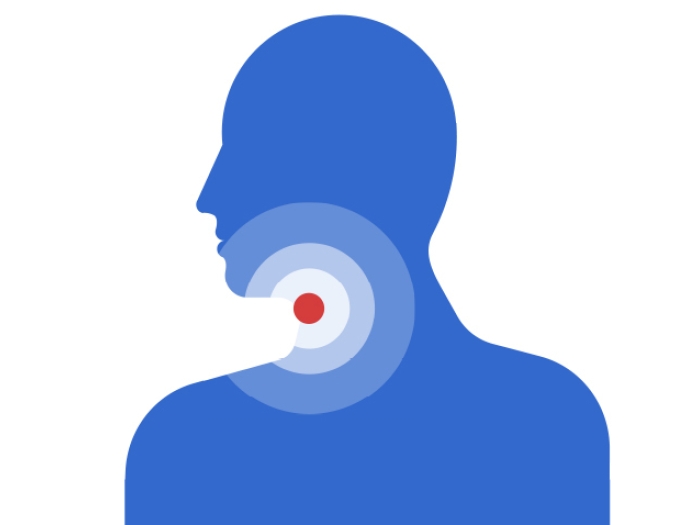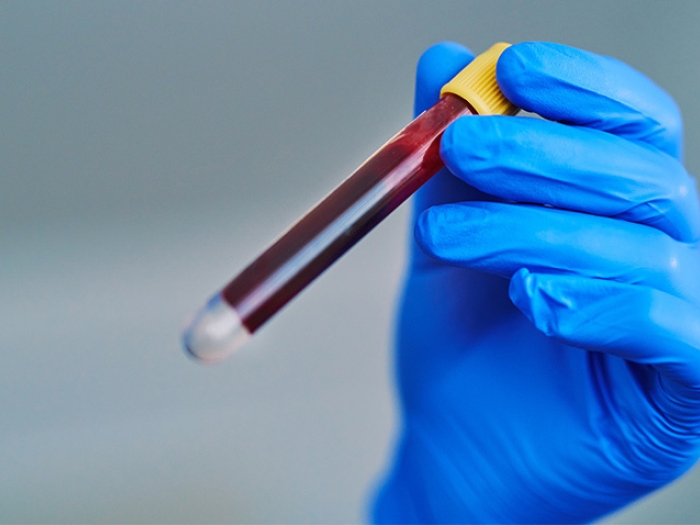Researchers find infiltrating lymphocytes tie to survival in patients with recurrent larynx cancer; findings suggest super-boosting the immune system before additional treatment.
12:45 PM
Author |

For some patients with larynx cancer, the disease persists or recurs after surgery, radiation and chemotherapy. Additional surgery often results in poor survival. Immunotherapy treatments can work sometimes, but which patients should receive the treatment before additional surgery?
Now, researchers at the University of Michigan Rogel Cancer Center have found biomarkers of cancer-fighting T-cells in patients with head and neck cancer that hold the promise of identifying who may benefit from immunotherapy and improve those patients' survival.
The immune system produces different types of T-cells, which express unique substances called biomarkers. These biomarkers show researchers which types of T-cells have infiltrated a tumor and are trying to fight it.
Our research can help us determine which patients will most likely benefit from immunotherapyMatthew Spector, M.D.
"If the body has lots of these cells in the tumor, then they can better fight cancer," says Matthew Spector, M.D., assistant professor of otolaryngology at Michigan Medicine, and an author of the study published in Cancer Immunology, Immunotherapy.
Immune-rich environment
The researchers showed that when the biomarkers CD103 and CD4 moved into a tumor, an "immune-rich" environment was created and a patient's chance of survival increased to 80 percent. Conversely, when CD103 and CD4 levels were low, in an "immune-depleted" environment, the survival rate was approximately 40 percent.
"Often when you have a biomarker, you wonder how many patients will be affected or how predictive it would be. We were surprised CD103 was such a strong predictor of survival in patients with recurrent or persistent head and neck cancer," Spector says.
LISTEN UP: Add the new Michigan Medicine News Break to your Alexa-enabled device, or subscribe to our daily audio updates on iTunes, Google Play and Stitcher.
Normally, oncologists use clinical staging to determine the progression of cancer and the likelihood of a positive outcome. However, in some cases staging may not provide the most accurate information.
"But this is different," says study author Chad Brenner, Ph.D., assistant professor of otolaryngology at Michigan Medicine. "We can take a piece of tumor from a patient and test it in the lab. We know if the patient has a high level of CD103, they are going to do well and we can tell them that information. For patients with lower levels of CD103, we can tell them we're worried about the tumor, and more treatment may be needed to fight this cancer."
Also, the tumor can be made more treatable by giving the patient immunotherapy or by boosting the immune system with vitamin C, antioxidants or zinc. A good healthy diet can also boost the immune system. After three weeks, if there is a positive response, then the patient may be ready for additional surgery or the next treatment, says Spector.
The retrospective analysis conducted at the Rogel Cancer Center involved 183 patients with recurrent or persistent laryngeal squamous cell carcinoma who had surgical removal of the larynx between 1997 and 2014.
Assessing immunotherapy
In a different study, Spector, along with Gregory T. Wolf, M.D., and other researchers, showed the combination of two other infiltrating T-cells – CD4 and CD8 – improved survival in patients with recurrent and persistent laryngeal squamous cell carcinoma. In yet another study of patients with lung cancer and serous ovarian cancer, researchers showed that CD103 and CD8 increased survival.
"Our research can help us determine which patients will most likely benefit from immunotherapy," Spector says.
MORE FROM MICHIGAN: Sign up for our weekly newsletter
Still, the research needs to be validated in a larger population. "In Ann Arbor, we can do these CD103 counts, but now we have to make sure that other research centers can do them," Spector says.
The technique for determining CD103 levels in tumors isn't difficult, he says. "It's basic stuff, and almost any lab can do it. It will take a few hours for researchers to learn the technique," Spector says.
The next step for Spector and his team is to meet with other clinicians and researchers and write a clinical trial to rigorously study and design new interventions to improve survival for at-risk patients, specifically those with low levels of CD103.

Explore a variety of healthcare news & stories by visiting the Health Lab home page for more articles.

Department of Communication at Michigan Medicine
Want top health & research news weekly? Sign up for Health Lab’s newsletters today!





